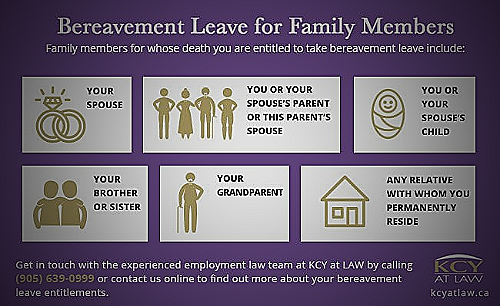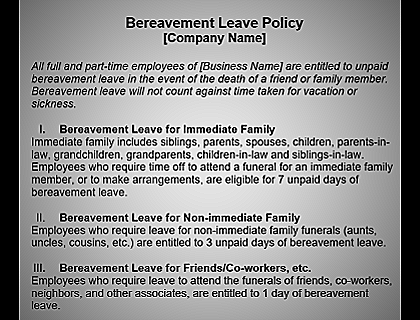2023 Definition of Immediate Family for Bereavement Leave
“Immediate family for bereavement” refers to the individuals that an employee is related to and is allowed to take bereavement leave for. The 2023 Bereavement Act will define immediate family members as an employee’s spouse, parent, child, brother, or sister, as well as relatives up to the third degree of consanguinity.
This type of leave is granted when an employee needs to take time off work to mourn the loss of a loved one and participate in planning and attending funeral services.
According to www.congress.gov.ph, the 2022 Bereavement Act outlines the definition of bereavement leave and pertains specifically to the immediate family members of an employee. This means that an employee can take time off work to mourn the loss of their spouse, parent, child, brother, or sister, as well as relatives up to the third degree of consanguinity.
The new law ensures that employees have the opportunity to take time off work to grieve and attend funeral services without worrying about losing their job or being penalized. With the passing of the 2023 Bereavement Act, this definition will be enshrined in law, giving employees clearer guidelines about what constitutes immediate family for bereavement leave.
It is important to note that while the law provides for bereavement leave, the number of days allocated for this type of leave may vary depending on the company or organization’s policies.
Scope
According to the “2022 Bereavement Act” and various online resources, immediate family for bereavement leave typically includes an employee’s spouse, parent, child, brother, sister, grandparent, grandchild, aunt, uncle, niece, nephew, and domestic partner. The Act specifies that bereavement leave is provided to allow employees to mourn the loss of a loved one and to participate in planning and attending the funeral services.
The Act applies to various types of organizations, including both private and public sectors.

Immediate family for bereavement refers to the individuals closely related to the employee who passed away and qualifies for bereavement leave. Different sources have different interpretations of who qualifies as immediate family for bereavement leave.
According to the 2022 Bereavement Act, immediate family members include a spouse, parent, child, brother, or sister, as well as relatives up to the third degree of consanguinity. Workable policy defines immediate family as spouses or domestic partners, first degree relatives such as parents, siblings, and children, along with grandparents, grandchildren, aunts, uncles, nieces, and nephews.
Legalbeagle.com defines immediate family as only an individual’s parents, siblings, partner, and kids, while lawinsider.com defines it as individuals who are closely related to the person in question, including a mother, stepmother, father, stepfather, husband, wife, son, daughter, grandparent, grandchild, brother, sister, half-sibling, step-sibling, parent-in-law, child-in-law, and cousin.
Therefore, the definition of immediate family for bereavement leave may vary depending on the employer’s policy or the law in a specific jurisdiction. It is essential for the HR department to provide clear communication to their staff about the company’s bereavement leave policy.
As defined by the 2022 Bereavement Act, immediate family members are eligible for bereavement leave. According to Congress.gov.ph, this includes an employee’s spouse, parent, child, brother, sister, as well as relatives up to the third degree of consanguinity.
Aside from these specific individuals, Legalbeagle.com states that an employer may also consider grandparents, grandchildren, aunts, uncles, nieces, and nephews as part of the immediate family.
In accordance with bereavement policies from Workable.com, Brampton.ca, and Lawinsider.com, immediate family members who pass away are eligible for paid bereavement leave. Additional time off may be requested or provided through other means such as vacation time, lieu time, or unpaid leave.
The exact provisions and conditions for bereavement leave may vary depending on the employer.
It is important for employers to understand and uphold policies regarding bereavement leave to support their employees during difficult times and prioritize their well-being.
The steps that employers and employees will need to follow to comply with the 2023 Bereavement Act are to grant an employee time off work to mourn the loss of a loved one or participate in planning and attending the funeral services of their immediate family member. Immediate family members include an employee’s spouse, parent, child, brother, or sister, as well as relatives up to the third degree of consanguinity.
To comply with the act, employers should consider additional time off for those who need it, such as extra days as vacation time, lieu time, or unpaid leave. Noncompliance with the act could result in legal actions and consequences for the employer.
It is essential to follow the bereavement policy, including the definition of immediate family, to avoid legal issues.
Available Leave Options
Immediate family members require time off to mourn the loss of their loved ones or partake in the funeral arrangements or events held after the passing of the person close to them. What are the available leave options for employees besides bereavement leave?
According to Congress.gov.ph, the proposed “Bereavement Act of 2022” outlines the definition of bereavement leave, which applies to immediate family members. This includes an employee’s spouse, parent, child, brother, or sister, as well as relatives up to the third degree of consanguinity.
Companies offer three paid days off for the loss of an immediate family member and one day for extended family members like aunts and uncles. In some instances, workers may need to take extra time, which supervisors may provide as vacation time, lieu time, or unpaid leave.
It’s important to reach out and make contact with the bereaved as soon as possible, as mentioned by Betterhealth.vic.gov.au. Attending the funeral or memorial service is a thoughtful way to show support.
When speaking with the bereaved, let them express their emotions in their own way and avoid rushing them. Your main focus should be on actively and compassionately listening, and it’s okay to ask how you can be supportive if you are uncertain how to help.
To summarize, companies offer bereavement leave for immediate family members of the employee and extra time as vacation, lieu, or unpaid leave for those who need it after the loss of a loved one. It’s also important to support the bereaved by attending the funeral or memorial service and actively listening to them.
When an employee experiences the loss of an immediate family member, it is important to allow them time to grieve and attend to funeral arrangements. According to the proposed “Bereavement Act of 2022” by congress.gov.ph, bereavement leave applies specifically to an employee’s immediate family members, including their spouse, parent, child, brother, or sister, as well as relatives up to the third degree of consanguinity.
Employers can implement work schedule flexibilities to support employees during this time. Workable.com suggests that immediate family members include spouses or domestic partners, first degree relatives such as parents, siblings, and children, along with grandparents, grandchildren, aunts, uncles, nieces, and nephews.
Legalbeagle.com notes that employers need to consider only these specific individuals when granting bereavement leave for an immediate family member’s demise.
One way to support employees during this difficult time is by offering paid bereavement leave. Brampton.ca highlights that their organization values and understands the importance of taking time to grieve and thus offers paid bereavement leave after the passing of an immediate family member.
Supervisors may also offer extra days as vacation time, lieu time, or unpaid leave, based on their discretion and the employee’s request. This reflects their commitment to supporting their employees through difficult times and enabling them to prioritize their well-being.
In addition to providing work schedule flexibilities, being supportive and compassionate is key. Betterhealth.vic.gov.au encourages individuals to reach out and make contact, attend the funeral or memorial service if possible, and actively and compassionately listen to the bereaved.
It’s okay to ask how you can be supportive if you are uncertain how to help.
Overall, employers should prioritize providing work schedule flexibilities to support employees who are grieving the loss of an immediate family member. Paid bereavement leave and extra days off, along with being supportive and compassionate, can go a long way in helping employees during this difficult time.
Remote Work
Employees working remotely are entitled to take bereavement leave for the loss of an immediate family member, just like employees who work in a physical office. Remote bereavement leave policies should be implemented with the same best practices as in-office policies, which include providing paid time off for grieving and attending funerals.
Employers should also consider offering additional time off for those who need it, like vacation or unpaid leave.
Immediate family members, as defined by various sources, include spouses or domestic partners, first-degree relatives (parents, siblings, and children), as well as grandparents, grandchildren, aunts, uncles, nieces, and nephews, and also those within the third degree of consanguinity. These bereavement leave policies only apply to the death of immediate family members as defined.
Employers should make sure that the definition of immediate family is clearly stated in the bereavement leave policy.
Employers should also be compassionate and understanding toward their grieving employees. One way to show support is to attend the funeral or memorial service, where possible.
It’s important to acknowledge the loss and to actively listen to grieving employees to determine how best to support them through their difficult time.
Impact on Employee Engagement
The 2023 Bereavement Act will have a significant impact on employee engagement, particularly for those who have lost an immediate family member. Employers have a crucial role in supporting grieving employees during this difficult time, as it can affect their productivity, mental health, and overall wellbeing.
According to the proposed “Bereavement Act of 2022”, bereavement leave is granted to employees to mourn the loss of a loved one or participate in planning and attending the funeral services. This leave applies specifically to an employee’s immediate family members, including their spouse, parent, child, brother, or sister, as well as relatives up to the third degree of consanguinity.
Employers can offer paid bereavement leave to their employees after the passing of an immediate family member. Companies acknowledging the importance of taking time off to mourn the loss of loved ones helps increase employee engagement.
Furthermore, supervisors may offer extra days as vacation time, lieu time, or unpaid leave, based on their discretion and the employee’s request.
It is essential for employers to provide a supportive environment for grieving employees by offering resources such as counseling, support groups, and flexible hours. When an employee’s needs are met, they can return to work with a better mindset, more focus, and a higher level of engagement.
It’s also crucial to communicate with empathy when speaking with the bereaved.
Overall, employers have an opportunity to create a positive impact by supporting their employees during a difficult time. By providing paid bereavement leave, and other support resources, they can help employees through the grieving process, which can contribute to higher levels of engagement and productivity.

Conclusion
Employers should take the new provisions of the 2023 Bereavement Act seriously, and understand that immediate family for bereavement constitutes spouse, parent, child, brother, sister, and relatives up to the third degree of consanguinity. It’s important for a person who has lost a loved one to receive support, and taking time off work to mourn, plan, and attend the funeral or memorial services is crucial to the grieving process.
As a compassionate policy, most employers offer their employees bereavement leave, and it’s heartening to see that so many companies acknowledge the importance of taking time off to mourn the loss of loved ones.
References
- [alink href=’aHR0cHM6Ly93d3cuZG9sLmdvdi9zaXRlcy9kb2xnb3YvZmlsZXMvV0hEL2xlZ2FjeS9maWxlcy93aGRmczI4QS5wZGY=’ text=’RmFjdCBTaGVldDogTGVhdmUgZm9yIEZ1bmVyYWxzIGFuZCBCZXJlYXZlbWVudA==’]
- [alink href=’aHR0cHM6Ly93d3cubGF3aW5zaWRlci5jb20vY2xhdXNlL2RlZmluaXRpb24tb2YtaW1tZWRpYXRlLWZhbWlseS1mb3ItYmVyZWF2ZW1lbnQtbGVhdmU=’ text=’UmVsYXRlZCBDbGF1c2Vz’]
- [alink href=’aHR0cHM6Ly93d3cuc2hybS5vcmcvcmVzb3VyY2VzYW5kdG9vbHMvbGVnYWwtYW5kLWNvbXBsaWFuY2Uvc3RhdGUtYW5kLWxvY2FsLXVwZGF0ZXMvcGFnZXMvYmVyZWF2ZW1lbnQtbGVhdmUtYW5kLWxhd3MuYXNweA==’ text=’QmVyZWF2ZW1lbnQgTGVhdmUgTGF3cyBieSBTdGF0ZQ==’]

